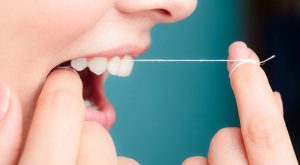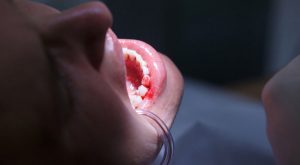Do Your Gums Bleed When Flossing?

Other than obvious gum disease, bumps on gums, having damaged gum tissue, or other periodontal disease, if you are new to flossing regularly, chances are you’re going to experience slight bleeding gums at the beginning of your new daily habit unless you are actually suffering from gum disease after all. While you might want to stop or are nervous that you are bleeding in the first place, it’s crucial that you continue to keep up this daily flossing regimen. Once your mouth, gums, and teeth become more accustomed to your flossing habits, the bleeding will—or should—stop.
If your gums are still bleeding when you floss, this means that you actually need to floss more often. So, while it may seem like you should stop, continue this practice and make sure that you floss habitually to ensure your gums remain as healthy as possible. To help you understand just why your gums are bleeding—and what you can do to stop it—we’ve written this article to make sure you are as informed as possible. With information on whyyour gums might be bleeding, as well as some resolutions you can take, we hope that your bleeding gum woes will be over as soon as possible once you finish this article.
Why gums bleed when you floss your teeth
First of all, it’s surprisungly commonthat gums start to bleed when flossing—especially if you don’t floss as often as you should. So, don’t worry! There are actually a lot of reasons as to whyyour gums might be bleeding as you floss. Sometimes, this is because there is plaque buildup along your gumline or between your teeth. This buildup can sometimes lead to gingivitis so it’s always important to make sure you flossand make it part of your daily habit. Your gums also might bleed if you have any type of vitamin deficiency.

There are so many reasons why your gums could be bleeding. For the most part, it might just be because you haven’t flossed for awhile and, therefore, your gums are not used to the practice. As we mentioned earlier, it’s important to make sure you continue to floss and get rid of any potential buildup. Your gums should stop bleeding when you floss after about ten days of regular flossing.
If you haven’t been flossing regularly in the past and are worried about any plaque buildup you may have, you can always make an appointment to visit your dentist to make sure everything is okay. If you do experience gingivitis, you may need your dentist to help remove any plaque buildup.
How to treat bleeding gums
If your gums are bleeding, you might want to remove the bacteria that might be settling around these areas of your mouth. One simple way to do this is to use an oral rinse or mouthwash to help make your gums and teeth as bacteria-free and healthy as possible! These oral rinses can help get rid of bacteria that flossing or your regular teeth brushing might have missed while also making sure that potential infection in your gums doesn’t spread elsewhere in your mouth.

Living a healthy lifestyle is also incredibly important to helping out your gums. A healthier lifestyle automatically helps with keeping your mouth as healthy as possible, as well as your body. Obviously, if you smoke, you are potentially damaging your gums, your teeth, and everything else in your mouth. It’s vital that you stop smoking as soon as possible to help with your overall health, as well as the overall health of your mouth.
Eating a balanced diet also helps keep your teeth and gums strong and healthy. The nutrients you gain from a balanced diet shouldn’t go ignored, as a lack in nutrients and vitamins is a potential reason as to why your gums are bleeding in the first place. Overall, you should make sure you try to be as healthy as possible in your everyday lifestyle. You should also make sure you brush your teeth regularly—at least twice a day—to make sure there isn’t any plaque buildup. And don’t forget about that daily flossing regimen!
As you can see, there are a lot of reasons why your gums could be bleeding when you floss. But that doesn’t mean that something horriblymajor is going on! To make sure your gums remain as healthy and robust as possible, just make sure that you floss as regularly as possible—and the bleeding should go away in about ten days. While there are a lot of reasons as to whyyour gums might be bleeding, there are also a lot of ways you can prevent or helpthis. Obviously, maintaining a balanced diet and a healthy lifestyle while you ensure a regular regimen of brushing and flossing your teeth is a great place to start!
Relate Posts to Read:
White Bumps on the Gums
Medically Fact-Checked & Written by Our Dental Editorial Team
You can read more about our editorial guidelines by clicking this link and learn more about the Emergency Dentists USA editorial team here.


